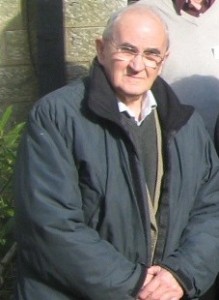Support us from £3/month
We deal with almost 1000 cases a year assisting communities, groups and individuals in protecting their local spaces and paths in all parts of England and Wales. Can you help us by joining as a member?
We are sad that John Riddall, who lived in Bradwell in the Derbyshire Peak District, has died aged 86. He had been our vice-president since 2003 and was a trustee (1987–1993) and our local correspondent for the Derbyshire Dales district (1986-1994).
With John Trevelyan he was co-author of the second, third and fourth editions of the famous ‘blue bible’ Rights of Way: a guide to law and practice, and the author of the second edition of our book Getting Greens Registered.
In our movement he will be best remembered, and with huge gratitude, for his campaign to kill what he called the ‘belief virus’. When claiming public paths or village greens, one has to prove 20 years’ use without interruption or challenge. As John wrote in the blue book: ‘… from 1928 onwards [Tomlin J’s aside in Hue v Whiteley] a virus infected the law, one that corrupted and distorted the logic on which the law has rested since Roman times. This virus, spreading from one judgment to the next, consisted of the view that for the presumption of dedication to arise, not only must user have been nec vi, nec clam and nec precario [without force, secrecy or permission] but also users must have believed that they had a legal right to use the way concerned.’
Illogical
He goes on to explain why this is illogical, an argument he spelt out in detail in his article ‘A False Trail’ [1997] Conveyancer vol 61. He expressed this view vehemently over many years and at last he was heeded. In the House of Lords judgment on the claim for a village green at Sunningwell, Oxfordshire in 1999, Lord Hoffmann in the leading judgment (unanimously approved by four other law lords), cited the article saying ‘I have been greatly assisted by Mr J G Riddall’s article’. He endorsed John’s thesis that people could not be expected to believe they had a legal right to use the path or the land when the use was itself evidence for the claim. Thus John and the law lords opened the door for countless successful claims of paths and greens.
John took care to write in plain English, making the most complex issues comprehensible to the layman; indeed he brought them alive. He was a barrister who never practised, and before retirement was senior lecturer in law at the University of Leeds. He wrote a number of law books, including many editions of Land Law, Jurisprudence and The Law of Trusts.
A small, unassuming-looking man he was a feisty fighter. He would not be shoved aside by bureaucracy and persisted until he spoke to the person responsible and got an answer. He fought wind turbines with ferocity and was constantly firing off letters to the Peak District National Park Authority, challenging it on quarrying (on which he was an expert) and planning. He campaigned against overweening and unnecessary roadsigns. He served on the Ramblers’ access committee for many years, helping to work out the details of right-to-roam legislation, and he was overjoyed when the access map for the Peak District was published, after the Countryside and Rights of Way Act, revealing that he had won new access to Bradwell Moor.
John was also a vice-president of the Ramblers and secretary of its Derbyshire Area for many years as well as countryside secretary of the Derbyshire Dales Group.
He was a delightful person with a dry but powerful sense of humour, and a surprising range of interests. He had a pilot’s licence for gliding and took off from Great Hucklow airfield above Bradwell. Late in life he took up stone-masonry. He gave talks on a range of subjects, always highly amusing. And he wrote the script for the village panto, Snow White and the Seven Bears, in 2008, which caused much hilarity.
John enlightened society and leaves us impoverished.

